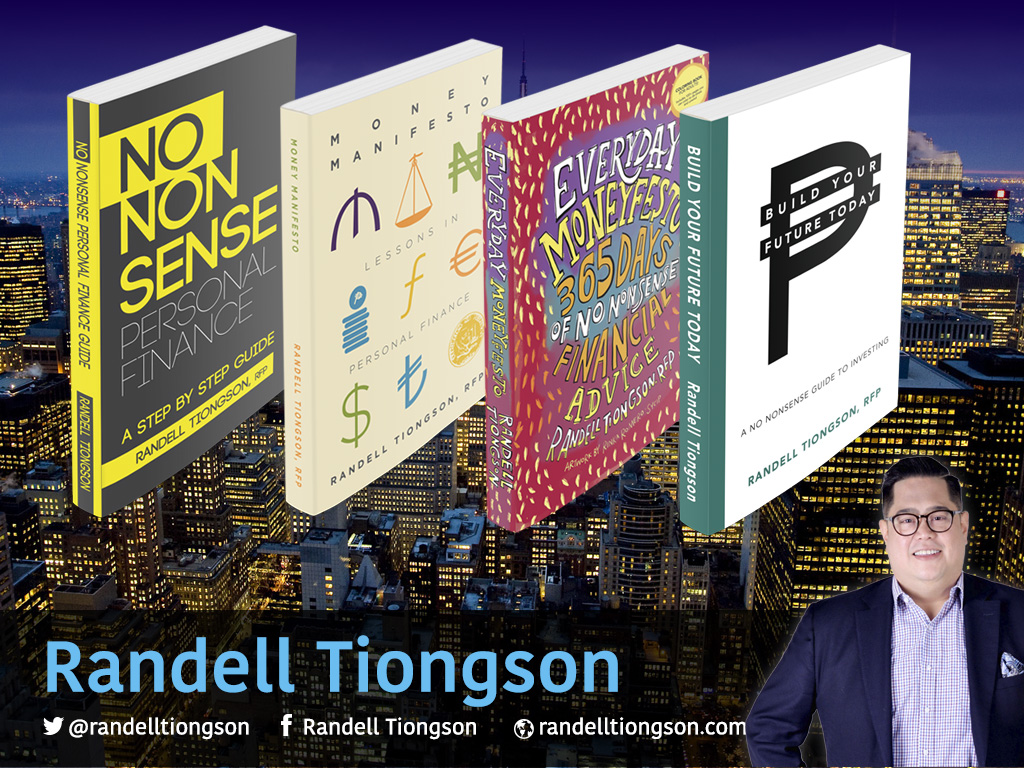10 Things to do with your 13th Month Pay
By Randell Tiongson on November 7th, 2016
QUESTION: It’s almost the end of the year, and I’m excited for my 13th month pay. I plan to use it to buy Christmas gifts for my family and friends, but I know I’m not supposed to spend all of it. What are the best ways to use the extra money?—Emily via e-mail

Answer: Ah, yes—the 13th month pay. For others, it even reaches the 15th month. That’s one to three months’ salary. There’s a lot you can do with the money, such as use it to buy Christmas presents, but I strongly suggest that you not spend it all. Aside from saving a part of the money, below are 10 things you can do with your 13th month pay:
1) Remove it from your payroll account
You probably have a question mark on your face, until you realize that inflation is eating up the value of your money. Unless you have P1 million in your account, you’re only earning 0.25 percent in interest yearly versus the 4 percent inflation rate in the Philippines last 2014. Withdraw a portion of your money from your payroll account and put it into higher-yielding accounts such as time deposits or investment accounts.
2) Plan and allot
According to research from the National Endowment for Financial Education, roughly 70 percent of people who come into windfalls end up broke within seven years. This is because they aren’t used to managing a large sum. Before you spend your 13th month pay, plan how you’re going to use it. Set a specific percentage which will go to savings, investments, and debt payments among others.
3) Increase your emergency fund
If you don’t have an emergency fund yet (roughly three to six months of living expenses), allocate a portion of your money to building one. This fund prepares you for unforeseen expenses such as emergency health costs, a sudden home repair, and even a job loss.
4) Build up your retirement fund
Your retirement fund is different from your emergency fund. Where the latter protects you from unforeseen events in the near future, your retirement fund prepares you for the more long-term future. As mentioned a while ago, remove the money from low-yielding accounts such as your savings or checking account, and put it in higher-yielding accounts such as investments.
5) Invest
There are many investments to choose from — mutual funds, unit investment trust funds (UITFs), stocks, variable universal life insurance and real estate to name a few. Your choice will depend on your risk tolerance. Whether you’re investing in mutual funds or the stock market, you’re sure to beat the 0.25 percent inflation rate of savings and checking accounts.
6) Pay off debt
Speed up your debt payment timeline and use a part of your 13th month pay to pay your debts, be it credit card debt, personal loans, car monthly payments, or what have you. Remember that the interest rates on these debts are sky high—it’s 3.5 percent a month for late credit card payments —so use the small windfall to tackle high-interest debt.
7) Important repairs
Your home may need a few repairs. For this, it’s best to resolve these sooner rather than later.
Taking preventive rather than corrective measures may save you big bucks in the future. If you put off repairing a plumbing leak, you may end up spending big bucks when your flooring or walls are affected by the leak.
8) Fund a fund
Whether it’s your travel or shoe fund, you can set a portion of your 13th month pay to fund items or experiences you’ve been saving up for.
If you love to save, you may have forgotten to treat yourself. You probably don’t remember the last time you went on a vacation or treated yourself to a nice dinner out. You deserve some relief from time to time, so set a portion to ramp up any ‘fun’ funds you have.
9) Spend on yourself
Related to the above, it’s hard to penny pinch all the time. It’s important to prepare for your future, but it shouldn’t be at the expense or to the detriment of your present self. Decades down the road, when you’re reliving your younger years to your grandchildren or to your friends during your university’s 50th-year reunion, you don’t want to stand on the sidelines without anything to say. Once you’ve made sure you’ve saved up for your future self, treat your present self to something nice. To have an easier time managing your ‘fun’ money from your savings or retirement fund, have separate accounts depending on what you’ll use the money for.
10) Bless others
Last but definitely not the least, share your blessings with others. Whether it’s donating to your local church or a cause you feel strongly about, never forget to give back. This develops the core value of sharing wealth with others in need and teaches you to appreciate the material goods you have. It’s also a reminder of stewardship and that money is really the Lord’s—we are merely managers.
There are many ways to use your 13th month pay. The bottom line is proper money management. Money is not a means to an end; it’s a vehicle for us to do what we want—whether it’s living a comfortable retirement or going on the vacation you’ve always dreamt of. When you receive your 13th month pay, don’t spend it all in one go. Budget and plan it, and if you can, share it.
“The wise have wealth and luxury, but fools spend whatever they get.” (Proverbs 21:20, NLT)
Best investments for retirement
By Randell Tiongson on November 3rd, 2016
Question: Hi Randell! Good morning! After browsing the net for Filipino personal finance tips, I learned about you. And after reading your articles, I’m very much driven to start investing. I’m already in my 30s and wishing I started earlier. But I can’t dwell on that anymore, so I’m ready to start now. As you keep saying, “the best time to invest was Tuesday, the next best time to invest is today.” With that, I know I should start investing, but where? With the multiple investments available, I don’t know where to start. It’d be great if you could help me on this. Thank you very much and God bless! —Carlo via Facebook

Answer: Hi Carlo! Thank you for messaging me. I’m sharing your query here in my column because I’m sure many Filipinos can relate to your situation. Many hold off saving for retirement because of the mentality that there are still many years left to save, but as you learned, the best time to invest was Tuesday, and the next best time is now. Don’t wait until you’re nearing retirement because investments are meant to be long-term. With that in mind, now we know that we should go for investment vehicles that are more for the long term. So what are these investments?
Property
Real estate is probably the favorite investment of Filipinos. While less than 1 percent of the Philippine population invests in stocks, bonds, and mutual funds, 7 in 10 Filipinos own their homes, according to the Bangko Sentral ng Pilipinas’ (BSP) 2012 Consumer Finance Survey.
Real estate is an advisable investment for retirement because the value of property appreciates through the years. Real estate property isn’t like a time deposit which gives you interest after a year (or less). You won’t make much by selling your property just after 6 or 12 months.
Stocks
Another investment vehicle is stock investing. Stocks are advisable for the long-term because they are risky. This means that the prices of stocks go up and down over a set time period, and you can lose money. One way to decrease your risk and avoid losses is to hold your stocks for the long-term, which makes stocks perfect for retirement. I recommend people to keep their stocks for a minimum of 10 years.
Seeing as you are in your 30s, you have about another 25 more years before you reach retirement age. That’s 20 years more than my suggested 10 years to spread your risk.
Pooled funds
I purposely put ‘pooled funds’ after ‘stocks’ because they are closely related. If you want to buy stocks of SM, Ayala, or Jollibee, you would have to buy them individually through a stock broker or your online trading platform. With pooled funds, be it a mutual fund or a UITF, you get a group of stocks in one basket or fund. The pooled fund can have SM, Ayala, and Jollibee stocks, depending which equities the fund manager buys. The fund manager does the investing for you.
He picks what stocks go into the pooled fund; all you have to do is make an investment deposit and keep track of your investments once or twice a year. It’s also important to know that there are different kinds of pooled funds, there are funds consisted entirely of stocks, others of bonds, while some funds offer a combination of different securities. For the purpose of retirement, and for Carlo who has about 25 years until retirement, a stock or equity-based pooled fund is best for a retirement which is still far away.
With three investments to choose from, you have a clearer idea of where to put your money for retirement. Now the only thing that’s left is to head to the bank (for UITF pooled funds) or a brokerage firm (for stocks and mutual funds) to fill out your application and open an investment account.
Variable Universal Life Insurance
A VUL is very similar to pooled funds but it has a life insurance component and therefore, there is cost of insurance imbedded in the policy. However, if you are in need of financial protection and also want to prepare for retirement at the same time, a VUL will come in handy.
With four investments to choose from, you have a clearer idea of where to put your money for retirement. Now the only thing that’s left is to head to the bank (for UITF pooled funds), a brokerage firm (for stocks) or a financial adviser (for mutual funds and VUL) to fill out your application and open an investment account.
Always remember that there is no such thing as a best investment. Remember to do your assignment well and do not forget to diversify and the key to a comfortable retirement is to start preparing early.
Read my books for practical finance and investments! Email michael@randelltiongson.com or visit National Bookstores to get my books!

Robbing yourself of future paychecks
By Randell Tiongson on September 22nd, 2016

How would you take the thought that you are stealing money from your future paychecks? Do you think that’s okay because you’ll have a bigger paycheck by then or the thought of it bothers you a lot?
That is what bad debt will do to you if you’re not careful with how you spend.
I will classify bad debt as money borrowed for debts that were spent on non-emergency situations. Some may think that a broken down smartphone or a travel getaway to another country with your friends. A funny definition of a bad debt is “using money you don’t have, to buy things you don’t need, to impress people you don’t like.”
But how will you avoid reckless spending that leads to debt? Here are some ways:
Change the way you see money.
The reason why most people go on a spending ban and binge spend after a month or so is because they view budgeting not as a lifetime goal but a short-term goal. There are instances when you’d do it for a trip or for an immediate purchase but not as a lifetime habit.
This is just the same as being in a debt cycle. You weren’t born wanting to have debt for unnecessary purchases. This is fostered through time and repeated actions.
Make the most of your age.
Are you below 30 years? This is the time that it will be beneficial for you to start investing and saving. You have more time to build your savings for retirement. If you are over 30, don’t fret. There is still time for you to build your funds.
It will be challenging at first because it is not mainstream to live below our means. Achievement will be looked partially through your new gadgets or new car by your peers. Remember that your true friends will not care whether you have the latest models of anything but for your friendship. Avoid giving in to peer pressure.
This is also the best time to begin investing. Do you know that investing only P2,000 a month with an average yield of only 8% p.a. will give you over a million in 20 years? Imagine if you invest more and in diversified investments? You may want to look at pooled equity funds like mutual funds or UITF; or you can start buying select stocks yourself. Remember, study the investment first and never invest in something you don’t comprehend.
Protect your loved ones.
This doesn’t mean that you will stop causing debt, but this can go on until you die. I don’t think you’d want your loved ones to pay for your wrong financial decisions.
Look through your life insurance coverage you have. Can this be used as collateral commitment to your loans so that no one will be bugged by this in the event that you die? Look at every debt you have and assess if this will be stretched until 20 to 30 years. Discuss this with your family members and your co-makers so they will get an idea of this and provide their insights on how you can bring this down.
Don’t borrow money which will not help you make more money.
If you are borrowing money to put up a business, then that’s good debt. If you are borrowing just to keep up with your neighbors or siblings, then that’s a bad one.
Ask yourself these questions before buying anything with borrowed money:
- Do I really need this?
- Can I find a more affordable option?
- Will this make me more money?
Compare prices before making major purchases.
Compare prices of smartphones with the same specifications so you’ll avoid overspending. Compare flights so you can get the cheapest rate to your destination. Never buy anything if you have not compared 2 to 3 option first so you’ll be sure that you got value for your money. I never buy anything on impulse, I try to check out all options before making any purchase.
Find other streams of income.
Let’s face it: one definite way to avoid debt is to have multiple sources of income since this can empower you to buy items in cash. Find ways to get other sources of income through online portals like Raket.ph, Kalibrr, and other job boards. Multiple streams of income is a a good idea!
Final Thoughts
You can achieve anything you concentrate and focus on and avoiding bad debt is no exception. Keep in mind that having bad debt robs you of your future income so avoid it as much as you can. Debt can can be good, bad or ugly; wisdom dictates you know which is which.







